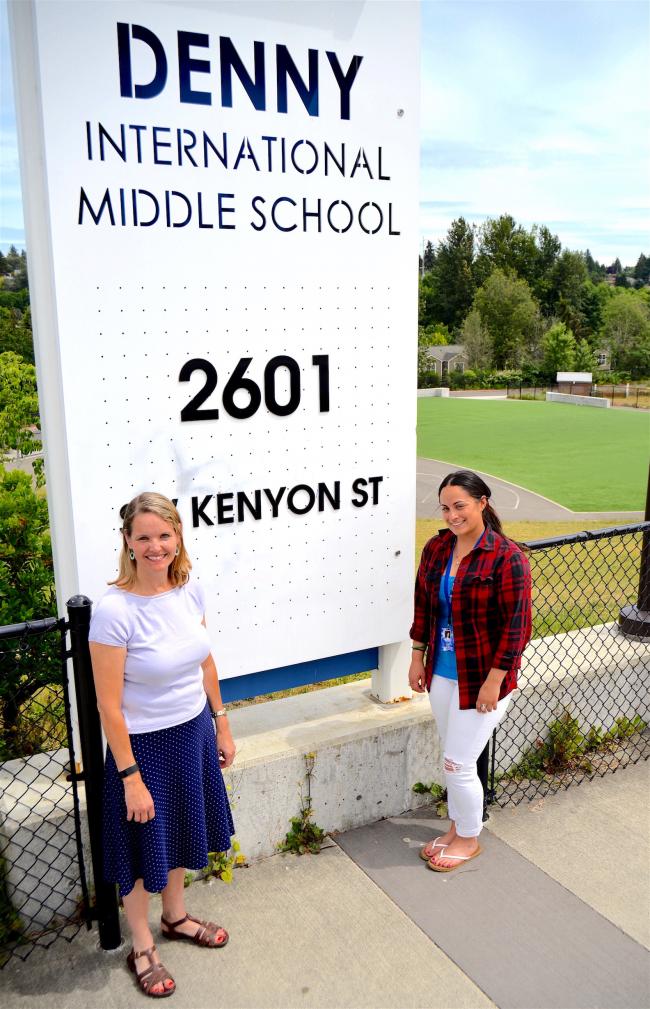King County is looking for a few good volunteers – to help prevent substance abuse in West Seattle.
Laura Quinn, left, community coordinator for the King County’s Behavioral Health and Recovery Division, is working with Anastasia Tschida, student success coordinator for Communities in Schools of Seattle at Denny International Middle School, to build a new coalition to prevent substance abuse on the campus and adjacent Chief Sealth High School.
Mon, 06/06/2016
by Lindsay Peyton
Laura Quinn, community coordinator for the county’s Behavioral Health and Recovery Division, invites anyone interested in creating a healthier environment for teens and children in the area to join a new coalition.
The group will have its next meeting at 4 p.m. on Tuesday, June 21 at Denny International Middle School, located at 2601 SW Kenyon St.
Community members interested in joining may attend – and help guide the nascent organization as it moves forward.
Quinn explained that in 2012 the state changed the way it appropriates funding for substance abuse prevention programs.
“Instead of giving a lot of agencies a little money, they decided they would concentrate funding in higher need areas,” Quinn said. “They wanted to have community involvement as well.”
The new strategy meant bringing schools directly into the process of educating youth about the risks of drug and alcohol use.
In West Seattle, Chief Sealth High and Denny International Middle Schools were identified as campuses that needed help. In April, the state gave King County the go-ahead to move forward with the schools.
A grant totaling $110,000 will support the Chief Sealth/Denny Community Prevention and Wellness Initiative – a multi-pronged approach to addressing substance abuse.
The funding, awarded by the Washington State Department of Community and Human Services Behavioral Health and Recovery Division, goes to King County.
The county plans to subcontract with Seattle Public Schools as the fiscal agent for the new coalition.
Quinn said that starting next fall, a full-time employee will begin working on both campuses to identify drug and alcohol related issues.
Students may be referred to the program by teachers -- or may sign themselves up if they need help overcoming addiction.
There is also a community component to the program, which requires creating a coalition of concerned individuals willing to work to make a difference.
“These two pieces will work together,” Quinn said. “Now it’s our job to determine if the community is willing to come together to tackle these issues. We need community buy-in.”
She said the county requires that representatives of various stakeholders participate, including youth, parents, law enforcement, civic and volunteer groups, businesses, healthcare professionals, media, schools, youth-serving organizations, religious or fraternal groups, other substance abuse programs and local or tribal governments.
Quinn is currently reaching out across the community to get more individuals involved.
“They’ll be the people who shape the vision,” she said. “This is a big issue.”
The first informational meeting was held last week at the Neighborhood House Center in High Point.
Once the coalition is formed, Quinn said members will spend the next 12 months creating a strategic plan.
“We’ll be talking to all types of folks in the community and looking at all types of data to see what’s really the issue here,” she said.
The coalition will meet with focus group – and assess current services substance abuse prevention services offered in the area.
“Then we will look at the gaps,” Quinn said. “We have these needs and these resources. So what’s missing?”
By July 2017, programming will begin. The coalition is required to meet at least once a month – and every fall the group must conduct a community survey.
The group is charged with developing programs to change the environment that has allowed for substance abuse in the past – whether it’s cleaning up a vacant lot where children meet to drink or lobbying to change laws.
The county also requires the coalition to select from a list of tested programs that have been proven to prevent substance – and also to introduce innovative programs, like hosting teen dances or starting a prevention club on campus.
There are already four similar coalitions in King County, serving Central Seattle, Southeast Seattle, Highline/White Center and Vashon Island. Another new group will be created to serve Auburn.
“You have to build a foundation,” Quinn said. “I’ve heard lots of people here say this is a big problem. People often feel powerless, like there’s no recourse. Now we have an opportunity – and funding to create solutions and do something about it.”
She said ultimately the coalition will encourage teens to make healthy choices -- and help create a more positive and healthy environment for the community.
“It’s a blank slate, which is exciting,” she said. “But I do need some champions to step up.”
Anastasia Tschida, student success coordinator for Communities in Schools of Seattle at Denny International Middle School, is helping Quinn reach out to families in the area.
“I saw that there was definitely a need to have an in-school and in-community coalition,” she said. “A lot of times, services are duplicated or fall through the cracks. This is the perfect opportunity to bring everyone together.”
Tschida also serves on the Central Seattle coalition. “I know that it’s definitely made a huge impact on the students at Washington Middle School,” she said.
Tschida encourages community members to consider joining the coalition serving West Seattle.
“Come once a month, share your thoughts and expertise,” she said. “There’s really no downside in being a part of this.”
For information about joining the Chief Sealth/Denny Coalition, email Laura Quinn, laura.quinn@kingcounty.gov or call (206)263-8938.


